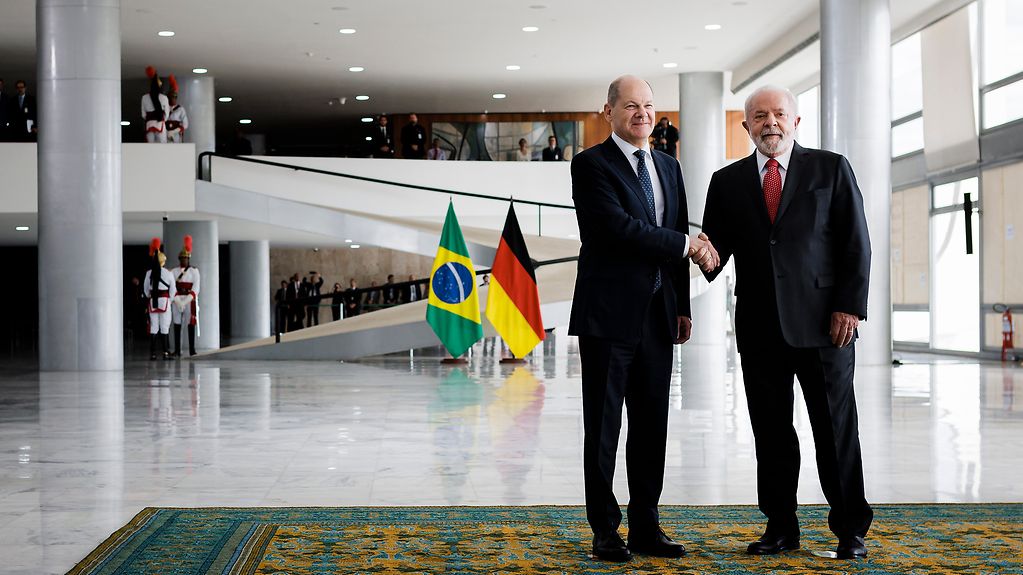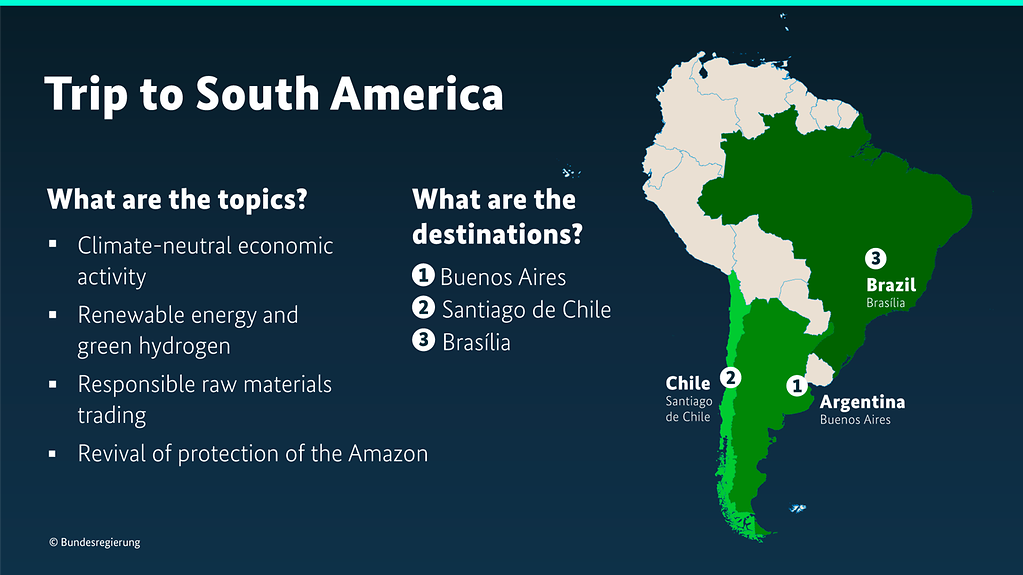Scholz visits Argentina, Chile and Brazil
On his trip to Brazil, Chile and Argentina, Federal Chancellor Scholz stressed the potential for bilateral relations. Germany intends to expand its economic cooperation with these three Latin American states. They are also key partners for renewable energy and climate protection.
7 min reading time

Federal Chancellor Olaf Scholz with Luiz Inácio Lula da Silva, President of the Federative Republic of Brazil, at the President’s official seat in Brasília.
Photo: Federal Government/Zahn
During the last stop of his trip to Latin America, Federal Chancellor Olaf Scholz was the first international head of state to meet Brazil’s President Luiz Inácio Lula da Silva in Brasília since the start of his term in office. In addition to reviving bilateral relations, their conversation focused on environmental and climate issues.
Importance of protecting the Amazon rainforest
“I came to Brazil today to start a new chapter in our relations,” Scholz said, adding that there were numerous issues on which Germany and Brazil should cooperate more closely in future. He pointed out that protecting the Amazon rainforest as the green lung of the earth was important not only for the region but for global climate, too. “It is great news for our planet that President Lula has committed himself to combating climate change, protecting the Amazon and stopping deforestation of the rainforest,” the Federal Chancellor said.
The two countries also shared interests with regard to developing renewable energy and producing green hydrogen, as well as concerning social transformation of the economy, Scholz stressed: “We already have strong economic ties. Your country is home to around 1,000 German-Brazilian enterprises. This is an impressive figure that we want to increase further in future.”
The Federal Chancellor continued to explain that the free trade agreement between the EU and MERCOSUR was in the interest of both regions, which was why both Scholz and Lula hoped for negotiations to progress swiftly. “The agreement is meant to pave the way for transformation of our national economies, and to strengthen technological and industrial cooperation,” the Federal Chancellor said. “It is also designed to reinforce environmental and climate protection and to improve labour and social standards.”
Following his talks with the president, the Federal Chancellor also spoke to representatives of the German and Brazilian business world in Brasília. Scholz visited a number of places in Brasília, including Cerrado National Park, where he exchanged views with representatives of Brazilian society.
Germany and Brazil signed a joint declaration. The Federal Chancellor also invited President Lula and his entire cabinet to visit Germany for government consultations, aiming to reinforce and develop bilateral relations further.
Joint fight against climate change
Over the weekend, the Federal Chancellor had visited Argentina and Chile. Upon arriving in Santiago de Chile on Sunday, the Federal Chancellor met Chile’s President Gabriel Boric. In a joint press conference after their meeting, Scholz praised “the full range of our truly excellent bilateral relations, which have connected our countries for many years”, emphasising the desire to further develop these relations.
Scholz stressed the future key role of cooperation in the area of renewable energies and in particular hydrogen as the gas of the future, adding that Chile had great potential and outstanding conditions for climate-neutral hydrogen production.
“Our joint hydrogen pilot project ‘Haru Oni’ was launched in Patagonia, just a few weeks ago,” the Federal Chancellor explained with regard to producing hydrogen with wind power in southern Chile. “The Federal Government provides funding for the project and Siemens Energy contributes the necessary technology for ‘Haru Oni’.”
Scholz stressed the great interest of German companies in expanding the long-standing partnership with Chile in the area of raw materials and lithium in particular. “We would like to support Chile on its journey towards sustainable mining,” Scholz pointed out.
Promoting the trade agreement
With regard to the association agreement between Chile and the EU signed in Brussels last December, Scholz said: “With this agreement we are setting standards for modern and ambitious trade agreements of the future.” He added that the EU member states and Chile shared the same views concerning sustainable and fair trade, which was why the agreement should now “come into effect as soon as possible.”
It had also been agreed in Chile to create new impetus for investments, he continued, and to especially promote such activities of small and medium-sized companies.
Germany and Chile signed a cooperation agreement for the German-Chilean partnership on mining, raw materials and the circular economy. In addition, the two ministries of economics signed a memorandum of understanding for cooperation in the fields of research, development and innovation.
Clear position with respect to the war against Ukraine
Russia’s war against Ukraine was another topic that was discussed. “This war is not a European issue: it affects all of us,” Scholz stressed. He continued that the Russian attack was “a blatant breach of international law and order we collectively agreed on.”
During his visit to Chile, the Federal Chancellor also said that Russia’s war of aggression against Ukraine that had been going on for close to a year had extensive global consequences. He added that the impact was particularly apparent in raw material prices and food security.
Scholz called for all democracies around the world to close ranks, and to not accept serious violations of international law and order, saying that Chile’s clear condemnation of the Russian aggression was very important.
Joint assessment of human rights violations
This year marks the 50th anniversary of General Pinochet’s military coup, and the Federal Chancellor highlighted that it was crucial to reappraise human rights violations committed during that era. Scholz expressed his appreciation of the Chilean government’s decision to create a place of remembrance and a documentation centre on the site of the former “Colonia Dignidad”, saying that he will be pleased to assist in this endeavour.
In remembrance of the Chilean dictatorship, Scholz had visited the “Museo de la Memoria y los Derechos Humanos” (Museum of Remembrance and Human Rights) in Santiago de Chile earlier during his stay.

On his trip to South America, the Federal Chancellor visited Argentina, Chile and Brazil.
Photo: Federal Government
Close partnership with Argentina
The Federal Chancellor started his trip to South America by visiting Argentina on Saturday. Following his conversation with Argentina’s President Alberto Ángel Fernández, the Federal Chancellor highlighted the role of bilateral relations with Argentina, in particular with regard to international cooperation. He drew particular attention to the great potential for consolidating trade relations, including the EU-MERCOSUR agreement and targeted funding for start-ups and young entrepreneurs.
Germany and Argentina signed two letters of intent: one for intensifying cooperation in connection to the energy transition and for continuing the energy dialogue, and another for developing a model project for the “German Accelerator” in the Argentine Republic.
The Federal Chancellor also called for stronger cooperation in the financial sector and on climate protection, such as by developing wind, solar and hydro power and generating green hydrogen. In view of the issue of energy supply and the use of raw material deposits, he pointed out that policies which only served the interests of those countries who wished to process such raw materials for their own benefit were not an option.
While in Argentina, the Federal Chancellor also expressed his gratitude for the joint approach to the Russian attack on Ukraine, for example in the UN General Assembly.
In addition to his political discussions, the Federal Chancellor also met German and Argentine business representatives in Buenos Aires, as well as getting together with young people from Argentina in the context of a “Town Hall” talk. Scholz also visited the Pacheco Volkswagen production plant.
Site of remembrance of the dictatorship
In Buenos Aires, the Federal Chancellor also visited the “Parque de la Memoria” memorial site, which Scholz described as a “touching site of remembrance of the countless victims of violence, state terror and dictatorship in Argentina”.
Commemorating the many victims of the dictatorship made him think of all those young people, “who are now being killed in Iran for standing up for their freedom and for a better life,” the Federal Chancellor explained. This was why he was very grateful to all those who fought for democracy and thanks to whom the country could now look back on 40 years of democracy, he added. “We will be happy to help to make sure that this continues to be the case in the future,” Scholz stressed.
“It reminds us that democracy and freedom should not be taken for granted. They are something we must stand up for every day and that we must reinforce on a daily basis.” He added that it was our responsibility to make sure that times like those remain a thing of the past.
























